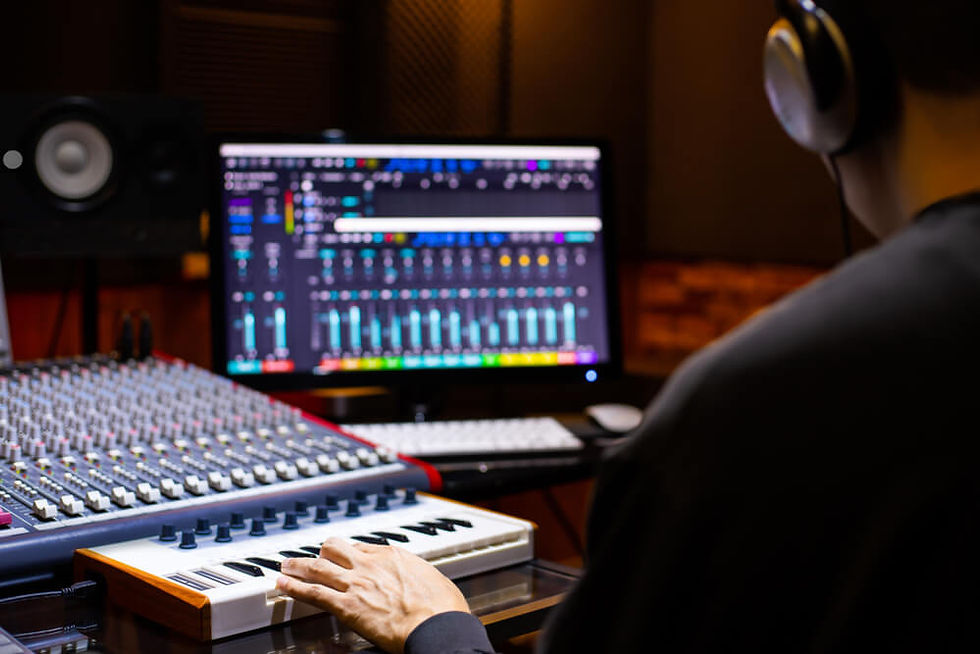9 TOP TIPS | Preparing For A Recording Session |
- Nick @ Audio Adventures

- Dec 23, 2024
- 3 min read

To make the most of an Audio Adventures studio session, the artist needs to be well-prepared. Studio time is valuable, and efficient use of that time can lead to a smoother, more productive session. Here's a guide on how to prepare for a studio recording session:
1. Preparation of Material:
Song Structure: Ensure that your songs are fully written, with the arrangement, lyrics, and chord progressions finalised. This means knowing where verses, choruses, bridges, and intros/outros fall.
Rehearsal: Practice with your band or as a solo artist. Know your parts and timing inside out. The more you rehearse before recording, the smoother the process will be.
Set Goals: Define clear goals for the session—whether it’s tracking a specific part of a song, recording vocals, or capturing a rough mix. This helps avoid aimlessness and gives the session a structure.
2. Practice and Pre-Session Runs:
Run-Throughs: Do full run-throughs of all the material you're going to record. Focus on timing, delivery, and vocal control.
Demo Recordings: Record demos to understand how the song is coming together. This allows you to spot any changes that may need to be made to the arrangement or performance before the session.
Click Track Familiarity: If you’re using a click track, practice with one so you’re comfortable recording to a metronome. Timing is critical in the studio.
3. Communication with the Producer/Engineer:
Discuss Vision: Make sure you’ve communicated your vision for the song with the producer or sound engineer ahead of time. This includes genre, vibe, and any specific recording techniques you'd like to use (e.g., certain mic placements, effects).
Song References: If there are certain songs that inspire the sound you’re going for, share them. Reference tracks can help convey the desired sound.
Recording Plan: Talk through the recording process. What’s the priority? Will you start with vocals, or something else?
4. Vocal Preparation:
Warm-Up: If you're singing, ensure you warm up your voice before the session. This helps with vocal control and reduces the chance of strain.
Rest Your Voice: Avoid heavy speaking or singing the day before a vocal recording session to preserve your vocal health.
Hydration: Drink plenty of water before and during the session to keep your vocal cords hydrated.
5. Mental and Physical Preparation:
Get Plenty of Sleep: Being rested and alert will help you stay focused and productive.
Clear Mindset: Focus on the performance and the creative process. Recording can be stressful, so having a calm, positive mindset is essential.
Stretch and Relax: For instrumentalists, warming up physically can prevent injury. Stretching before you play can improve your overall comfort, especially for longer sessions.
6. Know the Studio's Workflow:
Understand the Schedule: Know what time to expect the engineer and how long you have. This helps the engineer plan their day more effectively.
Allow for Breaks: You’ll need breaks to prevent burnout. Plan when you’ll step away to clear your head and maintain your energy levels.
Session Flexibility: Have an open mind for changes. The engineer or producer may have suggestions that improve the recording.
7. Documentation and Notes:
Lyric Sheets & Charts: Bring printed lyrics and song charts for reference, especially if there are complex sections or multiple vocal harmonies.
Song Notes: If there are particular nuances to your performance (e.g., "I want a more intense chorus" or "Let's focus on the groove here"), write these notes down to guide you during the session.
8. Attitude and Communication:
Collaborate: Be open to feedback from the producer, engineer, or other musicians. The studio is a creative environment, and collaboration often leads to better results.
Stay Calm and Positive: Things may not always go according to plan. Keep a good attitude and stay flexible with the process. Patience is key in the studio.
9. Budget and Time Management:
Stick to the Schedule: Make the most of the time you have. Prioritise the most important elements of the song (like tracking the core parts first) and leave extra time for overdubs or experiments.
Being prepared ensures that your time in the studio is used productively, allowing you to focus on making music rather than dealing with avoidable obstacles. With the right mindset and planning, you'll be able to utilise the session to its fullest potential.





Comments